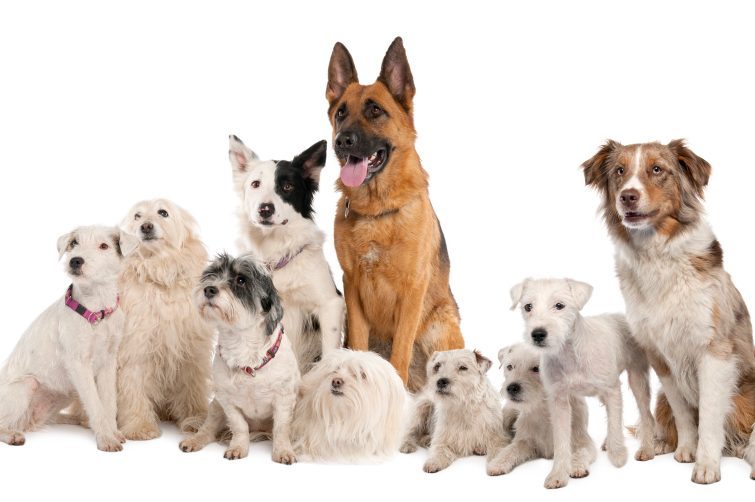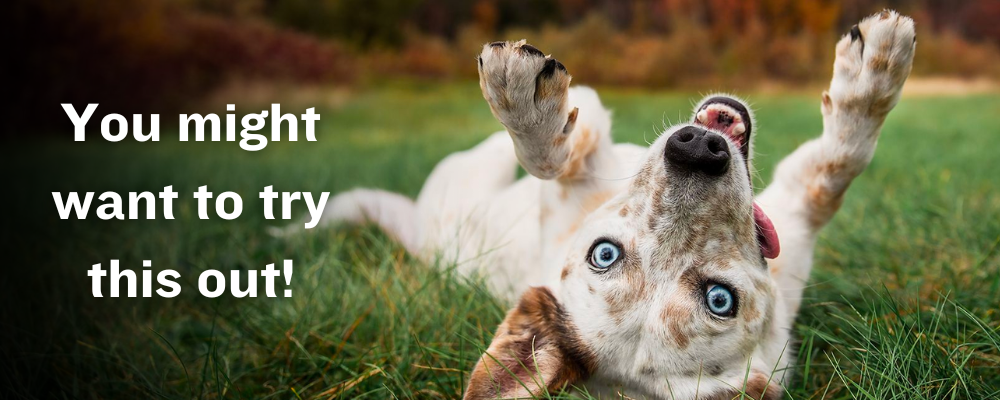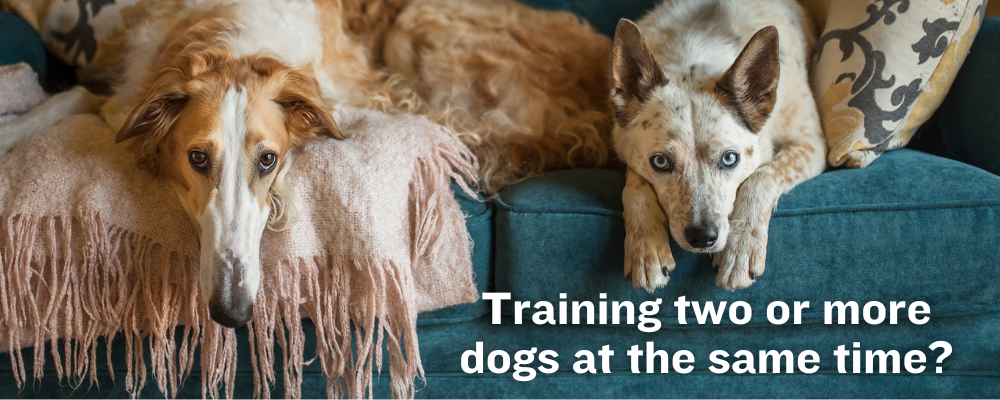German Shepherds are undoubtedly one of the best companions for humans – no question asked. And they usually get along well with all of your family members including kids. But when it comes to pairing your German Shepherds with other dogs or smaller dogs, in particular, it can be an entirely different story.
German Shepherds and smaller dogs can get on well if both are properly socialized and well-trained. They can become an excellent pack, and live a long, peaceful life together. Small dogs with high energy levels, like terriers or hunting dogs, can be a good match for your GSD. While pooches with a laid-back demeanor like Chihuahua or French Bull Dogs may not be perfect.
Because of their sheer size, it can be intimidating to introduce your German Shepherd to a small dog or vice versa. If you are thinking of adding a German Shepherd to the family, or you are a German Shepherd owner looking at adding a small dog, read on for tips on how to safely help your German Shepherd and small dog to get along!
Things to be aware of when introducing a German Shepherd to smaller dogs
Does size matter?
Typically, adult German Shepherds are considered to be medium to large in size, ranging anything from 65 to 100 pounds on average. So there is a probability that the most well-behaved GSD may injure a small dog unintentionally — just because of the size disparity between the two dogs.
Also, some German Shepherds, if not well trained or socialized early on, may have a strong prey drive. They might see smaller animals as prey, and chase or accidentally injure them.
They might also be biting playfully, and while this is not a problem between two dogs of the same size, accidents can happen with smaller animals.
Because of the size difference between GSDs and other small dogs, it is critical to supervise playing when your German Shepherd first met a smaller dog.
Does gender matter?
Just like any animal species, males tend to be more aggressive towards other males, and kinder towards females. Opposite sexes will be easier to introduce to each other.
Female GSDs will often have better interactions with small dogs than male GSDs, owing to their maternal and less domineering disposition.
Furthermore, male GSDs tend to be bigger and more muscular than female GSDs, and they might be too strong for smaller pups. Their athletic nature may cause them to push smaller animals around.
Does age matter?
While two young dogs are easier to introduce, pups are also harder to control and train. Adult GSDs above 2 years old with stable personalities can be more even-tempered and receptive to instruction.
Boisterous GSD puppies younger than 12 months old can play rough and accidentally hurt a smaller dog.
Does breed matter?
Some breeds of small dogs are calmer than others. For example, a Chihuahua or Jack Russell might be too hyperactive and trigger a German Shepherd’s prey drive, while other dog breeds like the Maltese or Bichon Frise have a tendency to be calmer.
Also, Chihuahuas and Jack Russells also have big personalities and can be dominant, which is not a good idea with a German Shepherd!
How to introduce a small dog to your German Shepherd for the first time?
The size and power of a German Shepherd can easily overwhelm a smaller pooch, so it’s crucial to anticipate your German Shepherd’s reaction if you decide to bring a new small dog into the house. An untrained GSD can be possessive or predatory toward other dogs.
Here are a few suggestions for getting your GSD to accept a new dog.
- Before bringing your new dog home, gather all of the items that your GSD would defend in one location. Some examples of objects that your GSD might defend include food dishes, bones, bedding, and toys.
- Although your GSD has never shown signs of being possessive in the past, it’s wise to be cautious and avoid placing the dogs in a position where they have to compete over toys or food.
- Introduce them in a neutral setting first. Let them meet out in open spaces, and make sure to have leashes on.
- It is also critical to keep an eye on the activity of both dogs at the same time. Separate the small dog from the GSD when you are unable to oversee them and do not allow the German Shepherd to bully or play too aggressively with the new dog when you are not there.
How to train your GSD to be gentle with small dogs?
Being the 3rd most intelligent dog on earth, German Shepherds are one of the most trainable dog breeds you can encounter.
Just look at the numerous working dog roles in the military and police! Their extreme intelligence and trainability make German Shepherds the most sought-after working dog breeds.
However, they are bod, big, and imposing dogs. And introducing a big dog to a small dog can sometimes be a nerve-wracking experience for the owners.
One way to do this is by providing positive reinforcement when your big dog is being gentle with your small dog. This could mean rewarding your big dog with treats or petting them when they’re being gentle.
Have a well-trained German Shepherd that knows the “drop it” and “leave it” commands.
You should also keep a close eye on your dogs when they’re interacting and separate them if necessary. If you see that your GSD is becoming too rough, be sure to intervene and correct their behavior.
How to prevent fights between German Shepherds and small dogs?
Mind you, a fight between a German Shepherd and a small dog isn’t going to end well!
Unless you are 100% sure of their behavior, you’ll need to keep a close eye on both dogs until they are well-integrated with each other.
Here are a few things that you can do to help prevent fights between dogs.
- Before they get used to each other, you can keep them in two separate rooms, or have their bowls, crates, and beds on opposite ends of the house
- Make sure that the dogs have their own space to retreat to if they feel uncomfortable or threatened. You can have a smaller crate for your small dog that your GSD is unable to get into or a doggy door that gives access to a separate room that your GSD is unable to fit through.
- When they are eating, or enjoying their toys, you should also keep an eye on them when they are together to make sure that no one is getting too close to the other dog’s territory.
- When you’re out in the yard, keep both dogs on a leash to maintain control over both at all times.
- Consider getting your dogs spayed or neutered. It’s proven that neutering reduces testosterone levels and can decrease the levels of dominance in male dogs, while spaying reduces instances of unwanted aggressive behavior in most cases.
- Keep particularly devoted toys out of reach in the beginning, until you are sure of your GSD’s reaction
- Feed them separately and in separate areas.
- If you have a GSD with aggression issues, seek help from professionals
Do German Shepherds need another dog?
Owners of German shepherds may be wondering if their dog needs another dog in the home. The answer to this question depends on a number of factors, including the size of your home, the personality of your German Shepherd, and the personality of any other dogs you may already have.
German Shepherds are independent, intelligent dogs that don’t need much company. Depending on their personality, they can be solitary dogs that function well on their own. However, all dogs are pack animals and can always use the company.
Which small dogs go well with a German Shepherd?
German Shepherds are friendly, lively, athletic, and intelligent dogs that get along with a wide variety of other dogs of comparable size and temperament.
It will be ideal to find a dog breed with an energy level that can match your GSD. Examples may include terriers, Pugs, Corgis, or Beagles. That said, small dogs with a laid-back lifestyle, like Chihuahua, English or French Bull Dogs, should be avoided.
Will German Shepherd kill small dogs?
German Shepherd may accidentally kill smaller dogs out of their natural instincts. Prey drive is inherited in all carnivores, including herding dogs like German Shepherds. While pet dogs rarely need to prey on other animals, this instinct remains in their trait.
What fires a dog’s prey drive is the movement of a small animal. Sudden and quick movement triggers a reflexive response in dogs. If your dog sees a running dog or cat, his prey drive could have triggered him to chase, grab, bite and seriously injure his prey.
The good news is a well-trained, properly socialized German Shepherd will happily accept a small dog into the pack, some factors can place some risk in having a small dog in a German Shepherd’s territory.
Final thoughts
It is important to keep in mind that all dogs are individuals and have different personalities. While some German Shepherds may be good with small pets, others might not be so tolerant. The best way to determine if your German Shepherd will get along with other pets is by observing them together carefully. Make sure to give them enough space and provide a safe environment. If you’re still unsure whether or not your dog will like another animal, it’s always best to consult a professional trainer for advice.



